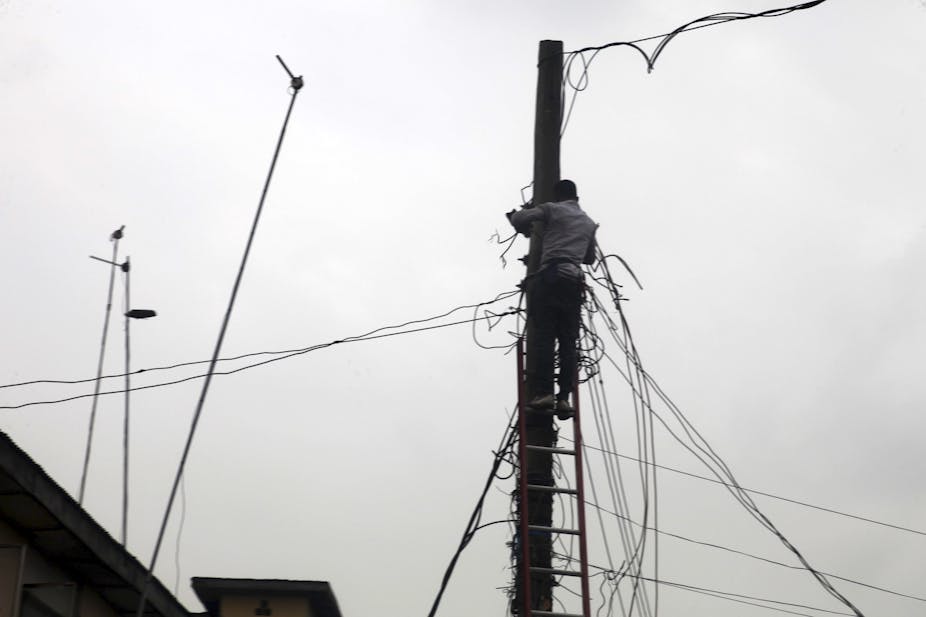Nigeria’s energy sector is regulated centrally by the Nigerian Electricity Regulatory Commission. This has created the conditions for corruption to thrive. The result is that the supply of electricity is unstable and cannot support economic development. Decentralised regulation is the solution, but has been prevented by conflicting laws.
Supplying electricity is a complex business. The sector has many aspects, all complex in themselves: engineering, accounting, tax, financing, laws and regulations, governance, consumer concerns and safety.
Countries often decentralise authority to simplify the management of the sector. They also decentralise the sources of energy generation, transmission and distribution and the means of funding the sector.
But Nigeria has done the reverse. Under the 2005 Electric Power Sector Reform Act, all regulations concerning electricity are made centrally for the 36 states and their 774 local government areas.
The central regulator cannot monitor all the players effectively. The result is corruption, poor service delivery and use of substandard equipment. Gas pipelines are sometimes vandalised by frustrated citizens whose local needs are not understood or met.
Why decentralise?
If the administration of electricity was brought closer to each area of the country, it would:
Increase efficiency
Allow for more innovation and business adventure
Create competition among the players in the industry and lead to better services.
Decentralised governance has helped reposition the energy sectors of several countries. Kenya, the UK, and many countries in Latin America have benefited from it. When these countries privatised their electricity sectors, they attracted private sector funds which were put into the system to improve supply.
The Constitution versus the Act
The Nigerian Constitution supports decentralised electricity regulation. It gives federal and state governments the authority to make laws that would improve supply.
So why isn’t this happening? Why is electricity regulation still in the hands of the federal government alone?
Provisions in the Act stand in the way.
The Constitution is clear. It allows both federal and state governments to regulate electricity. Electricity appears on what is known as the concurrent legislative list.
At the federal level, the Constitution charges the National Assembly with the responsibility to make the laws. It provides that the National Assembly may make laws for the entire federation or any of its constituent parts with respect to:
electricity and the establishment of electric power stations;
the generation and transmission of electricity in or to any part of the federation and from one state to another state.
At the state level, the Constitution charges the state Houses of Assembly with the responsibility of making laws to regulate electricity. They can make laws for the state with respect to:
electricity and the establishment, in that state, of electric power stations;
the generation, transmission and distribution of electricity to areas not covered by a national grid system within that state; and
the establishment within that state of any authority for the promotion and management of electric power stations established by the state.
The Act provides for the establishment of the Rural Electrification Agency. This administers a Rural Electrification Fund which is meant to provide, promote and support rural electrification programmes.
The roles played by the agency and the fund conflict with the Constitution. This is because the Constitution assigns these roles to the states. The Constitution gives states the powers to regulate off-grid electric power. And rural electricity is off-grid power.
The idea of the Rural Electricity Fund is a noble one, at least on paper. Just like its regulatory agency. But vesting rural electrification in the hands of the federal government runs counter to what is clearly intended in the Constitution.
An attempt to bring “off-grid” subjects within the national grid amounts to what I have previously referred to as “national greed”.
There is a third problem with the act.
It gives the Nigerian Electricity Regulatory Commission the power to make regulations for the granting of permits for “captive power” generation. The objective is to streamline the procedure for those who want to generate more than one megawatt of power for their own use.
This power should ordinarily vest in state governments. Like rural electricity, captive electricity generation is off-grid, and should be regulated by state governments as the Constitution intended.
The commission’s powers are therefore unconstitutional.
Finally…
Nigerians expect that as the electric power sector develops, state governments will set up State Electricity Regulatory Commissions as is the case in countries like India. Their job will be to license private companies to get involved in off-grid electricity generation, transmission and distribution.
To achieve a regular supply of power for economic development, federal and state governments must act as collaborators, not as competitors.
A good place to start would be to nullify the provisions of the Power Sector Reform Act 2005 that are in conflict with the Constitution.

